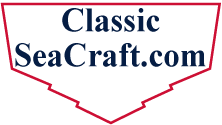
 |
|
#11
|
|||
|
|||
|
What about these for a plan?
Deck - Carbon-core plastic honeycomb for the core and 1700 with poly for the lamination. Final layer of 1708 and epoxy to bond to the hull sides and sanding/fairing and use epoxy putty for adhering to the stringers. Transom - Coosa board for core with epoxy and 1700 for every layer to adhere to the hull sides and bottom and final layer of 1708 for sanding/fairing. Stringers - Raising them 2" with Bigshrimpin's idea of vinyl gutters laid on top of the existing stringers and then 1700 with epoxy draped over to secure to the existing stringers. Bracket - Female mold coated with gelcoat then a layer of CSM and then 1700 and poly with Coosa board for a core. Lots of layers of 1700 and poly on both sides of the Coosa. Cap - mostly just the transom area so 1708 and epoxy so it can attach to the existing cap along the gunnels and be sanded/faired. Bulkheads/Console - Port bulkhead separating cuddy area from deck area will be just a flat panel so 1700/poly with a final layer of 1708/epoxy for bonding to hull and deck and fairing/sanding. Starboard side will be where the steering, controls, MFD, VHF, etc. are so a more complex shape, but same plan as port. All holes in the hull filled in will be 1700/epoxy. Sound reasonable? 1700 and poly for making parts with 1708 and epoxy as a final layer to bond them to the hull and so the CSM layer can be sanded into where needed. No 1708 for structural applications. Is one layer of 1708 enough to secure the deck to the hull sides? Maybe a strip layer along the seam then a full layer over the whole deck connection point? |
|
#12
|
|||
|
|||
|
Please post some detailed pics of your progress. Thanks.
|
|
#13
|
|||
|
|||
|
Once I get going do some actual work I will have a build thread started with pics.
I might just get some samples of 1700 and 1708 and poly and epoxy and play with them to make my decision. Could be fun.  Edit* A couple yards of 1708 and 17oz. cloth as well as a couple quarts of polyester and epoxy resin coming from US Composites to play around with. |
|
#14
|
|||
|
|||
|
Quote:
|
|
#15
|
|||
|
|||
|
If you're using the single thick sheet for the transom, you could use the cutoffs, cut accordingly, adhere them on edge on top of the existing stringers and have a very solid support for the deck material. Check my deck replacement post. My deck is solid!
__________________
1975 SF18/ 2002 DF140 1972 15' MonArk/ 1972 Merc 50 http://i833.photobucket.com/albums/z...photos/SC3.jpg |
|
#16
|
|||
|
|||
|
Quote:
The '71 Seafari has the 4 straight stringers. My plan is to raise them using 2"x3" vinyl gutters from home Depot. Benefit will be the raised deck, but also rigging tubes. The gutters will be glued to the tops of the existing stringers and then glassed over. I am confident it will give plenty of support. Your idea of the Coosa strips just gave me thought. I could glue strips along the hull sides. The edges of the new deck can sit on top of the strips, glued in place for extra support. Still glassed too. That should make the connection super strong. |
|
#17
|
||||
|
||||
|
Your plan sounds good, Just a few thoughts....
Quote:
When fairing there are two different ways I normally fair out epoxy coated surfaces. 1) If using all 1700 with a skim coat of fairing compound. 2) Using 1700 with the last layer of 1708 csm side up and fairing into the csm side itself. Both ways keep from sanding directly on 1700 fibers so I dont cut threw them. It is super hard to sand or fair the csm side of 1708. It will gum up the sand paper badly. Me I don't like using a lot of fair compound to skim out an entire surface so I use the 1708 but do still use small amounts touching up low spots. Using a lot of fairing compound to me is like using bondo on a car. I keep it to a minimum but nothing wrong with the stuff if used correctly. Also you can buy micorballoons or something like west systems microlite 410 to add to the resin to make the epoxy easier to sand. Lots of people do use just 1700 then do a 1/8th to a 1/16th thick of fairing compound and then block sand most of it back off to get a smooth surface. Either way will get good results and keep the 17 oz fibers strong and undamaged. Quote:
Quote:
Quote:
__________________
Current SeaCraft projects: 68 27' SeaCraft Race boat 71 20' SeaCraft CC sf 73 23' SeaCraft CC sf 74 20' SeaCraft Sceptre 74 20' SeaCraft CC sf |
|
#18
|
|||
|
|||
|
Good point about trying to sand straight epoxy. I can see how since it is softer it would not sand as well as the hard poly or VE. I can see fairing compound being so popular.
|
 |
|
|